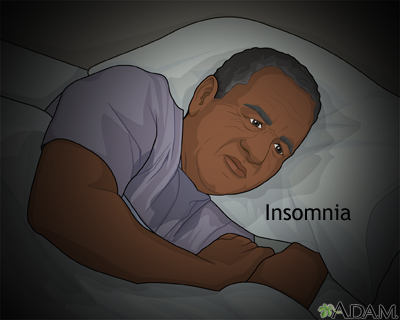Insomnia

What is insomnia?
Insomnia is a sleep disorder that makes it difficult for people to fall asleep or stay asleep, leading to a range of symptoms, including fatigue, mood disturbances, and difficulty concentrating.
Who's at risk for insomnia?
Insomnia can affect people of all ages and genders, but it is more common in women and older adults. Other risk factors for insomnia may include:
- Stress and anxiety
- Chronic pain or illness
- Medications that affect sleep
- Shift work or irregular sleep schedules
- Sleep disorders, such as sleep apnea
What causes insomnia?
Insomnia can be caused by a variety of factors, including underlying health conditions, medications, and lifestyle factors. Psychological factors, such as stress and anxiety, can also contribute to insomnia.
How does insomnia start?
Insomnia may start gradually or suddenly, depending on the person and the underlying cause. Some people may have trouble sleeping due to situational factors, such as stress or a change in routine, while others may experience chronic insomnia that persists over time.
What are the symptoms of insomnia?
The symptoms of insomnia may include:
- Difficulty falling asleep or staying asleep
- Waking up too early in the morning
- Fatigue or daytime sleepiness
- Mood disturbances, such as irritability or depression
- Difficulty concentrating or remembering things
- Increased risk of accidents or injuries
How is insomnia diagnosed?
Diagnosing insomnia typically involves a physical examination and a review of the person's medical history and symptoms. Sleep studies or other tests may also be done to evaluate sleep patterns and rule out other sleep disorders.
How can insomnia be treated?
Treatment for insomnia typically involves a combination of medications, such as sedatives and hypnotics, and lifestyle changes, such as improving sleep hygiene and managing stress and anxiety. In some cases, cognitive behavioral therapy may be recommended to help improve sleep habits and manage insomnia symptoms.
What complications may occur with insomnia?
Complications of insomnia may include:
- Increased risk of accidents or injuries
- Impaired performance at work or school
- Mood disturbances or depression
- Chronic sleep deprivation, which can lead to long-term health problems
How can I prevent insomnia?
Preventing insomnia may involve making lifestyle changes, such as avoiding caffeine and alcohol, improving sleep hygiene, and managing stress and anxiety. Avoiding certain medications or substances that can interfere with sleep may also help reduce the risk of developing insomnia.
Long-term management of insomnia
People with chronic insomnia may require ongoing medical care and monitoring to manage their condition and prevent complications. This may involve regular check-ups with a healthcare provider, as well as following recommended sleep hygiene practices and stress management techniques.
What is recent research saying about insomnia?
Recent research in insomnia has focused on improving understanding of the underlying causes and risk factors for the condition, as well as developing new treatments and therapies to manage symptoms and prevent complications. Some of the promising areas of research include:
- Identification of new genetic markers that may help predict the risk of developing insomnia
- Development of new medications and therapies that target specific pathways involved in sleep regulation
- Investigation of the impact of diet and lifestyle factors on sleep quality and insomnia symptoms
Where can I go for more information on insomnia?
If you or someone you know has insomnia or wants more information on the condition, it is important to seek help from a healthcare provider who specializes in the treatment of sleep disorders. The following organizations also provide information and resources on insomnia:

